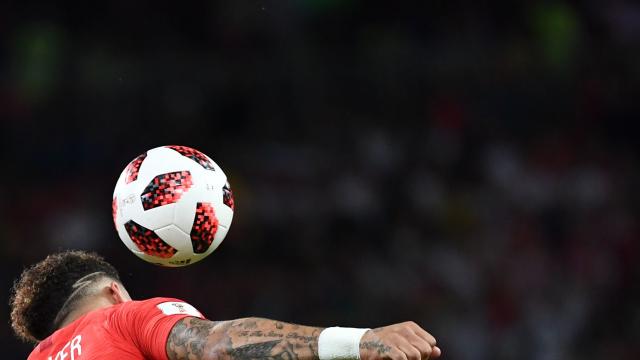A new study of soccer players seems to show that repeated mild blows to the head can affect athletes’ brain function, at least temporarily. It found evidence that players perform worse on simple tests of eye coordination and cognition right after heading a ball than players who simply kick it around, for up to 24 hours later.
Traumatic brain injuries (TBIs) with visible symptoms like short-term memory problems or headaches can range from severe to mild, with mild injuries often referred to as concussions. We know that the more TBIs someone experiences, including concussions, the more likely they could have lasting symptoms or a higher risk of future neurological problems like Alzheimer’s. But research has also started to suggest that repetitive mild injuries that don’t cause any symptoms—known as subconcussive head impacts—can affect people’s brain health.
Most of this research has focused on studying people in the real world over a length of time, such as student athletes during a football season. But this new study, published Thursday in JAMA Ophthalmology, is a randomised, controlled trial, often considered a better standard of evidence.
The trial recruited 78 healthy soccer players attending college, with at least five years reported experience playing the sport, and divided them into two groups. Each group played with a machine that spit out 10 balls at around 25 miles an hour. One group kicked the balls, while the other headed them instead. Afterward, everyone was given two widely used tests that can measure subtle visual problems linked to cognition.
One test had volunteers quickly try to read and speak back single-digit numbers from several cards at once. The other test measured the distance at which their eyes lost focus of an object and saw double as it got closer to the middle of their face—the farther distance away it takes to see double, the more impaired the connection between eye and brain is considered to be.
Players who headed the ball did worse on average across both tests than kickers, the researchers found, including on tests given right after the exercise, two hours later, and a day later. But the heading players reported feeling no worse off physically.
The findings, they wrote, “generate new evidence that repetitive subconcussive head impacts can impair neuro-ophthalmologic function”
Clinical trials are useful for helping prove a direct cause-and-effect link between any two factors—in this case, repeated mild head impacts and short-term cognitive problems. But there are still a lot of questions about how serious these subtle head impacts really are and if certain risk factors may make them worse.
Players who started the sport from an early age or who have headed the ball a lot might be affected more by these blows, for instance, but that’s not something the authors were able to test out in this study. Because the trial was only intended to last a day, they also couldn’t measure how long these cognitive effects lasted.
If people really can be hurt by seemingly harmless head hits, though, we might need better tools to measure that damage, beyond asking people if they’re feeling fine. To that end, the authors wrote, there should be further research studying whether these vision tests can be a “useful clinical tool in detecting acute subconcussive injury.”
